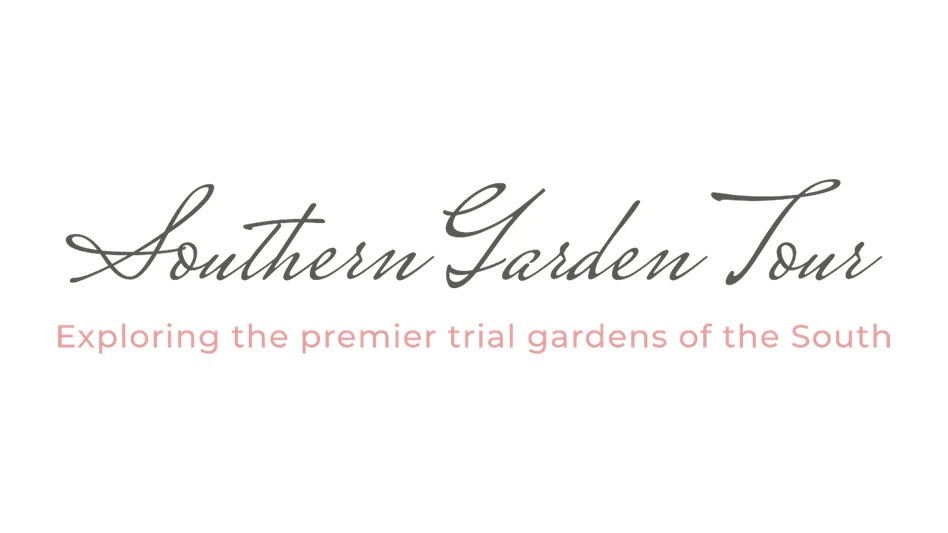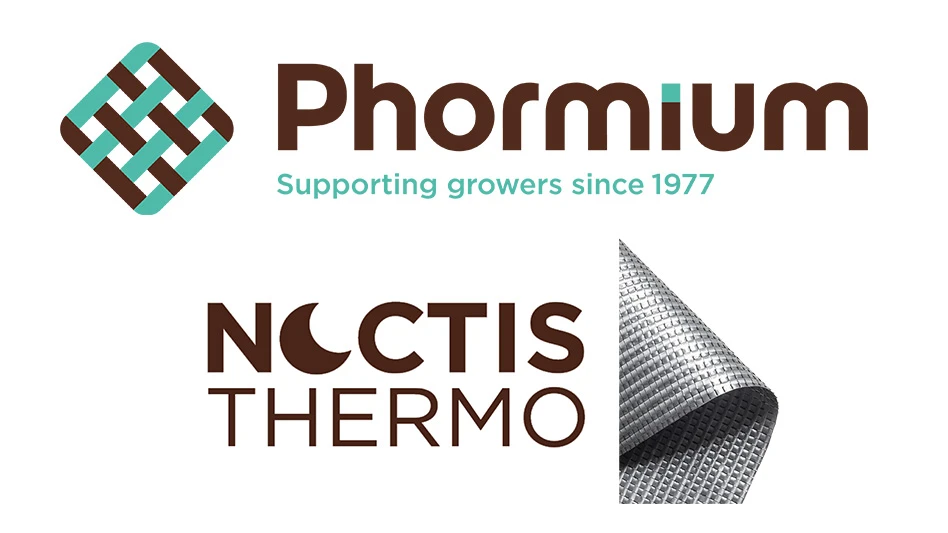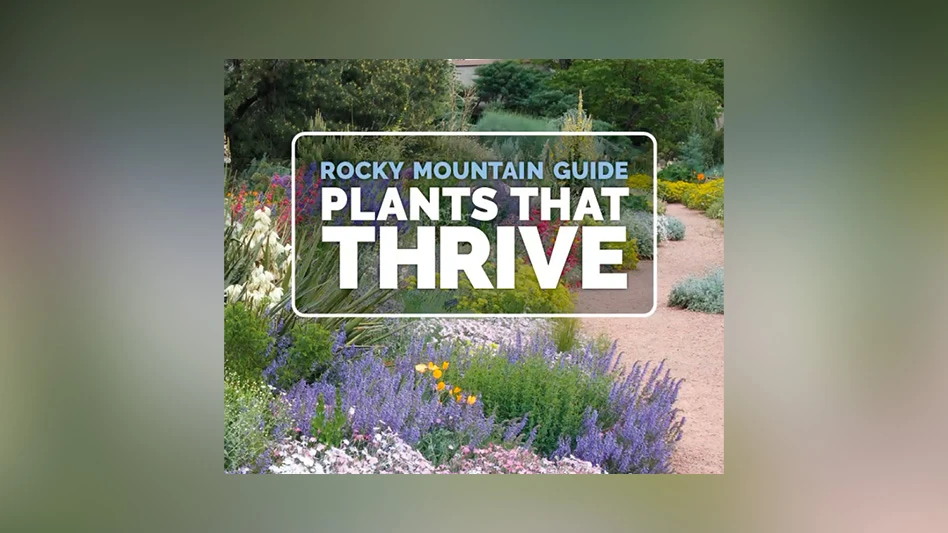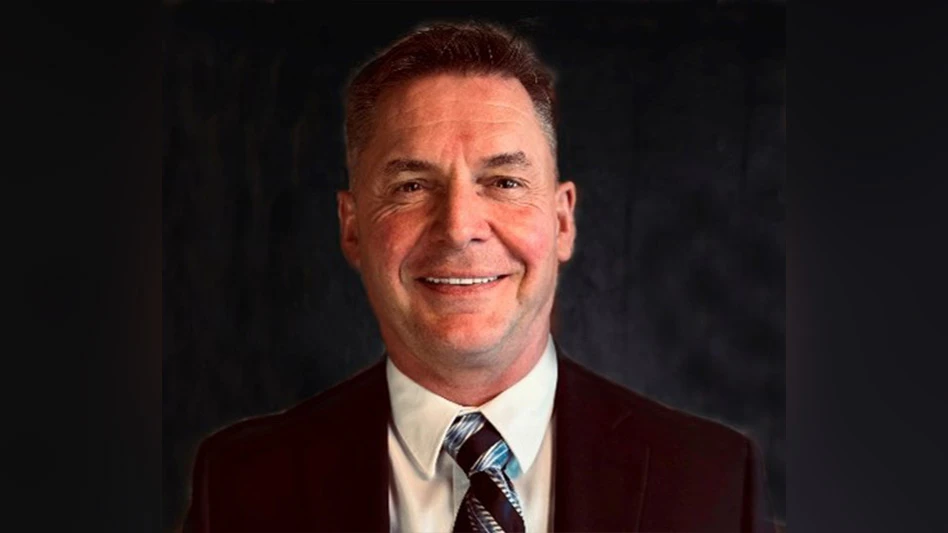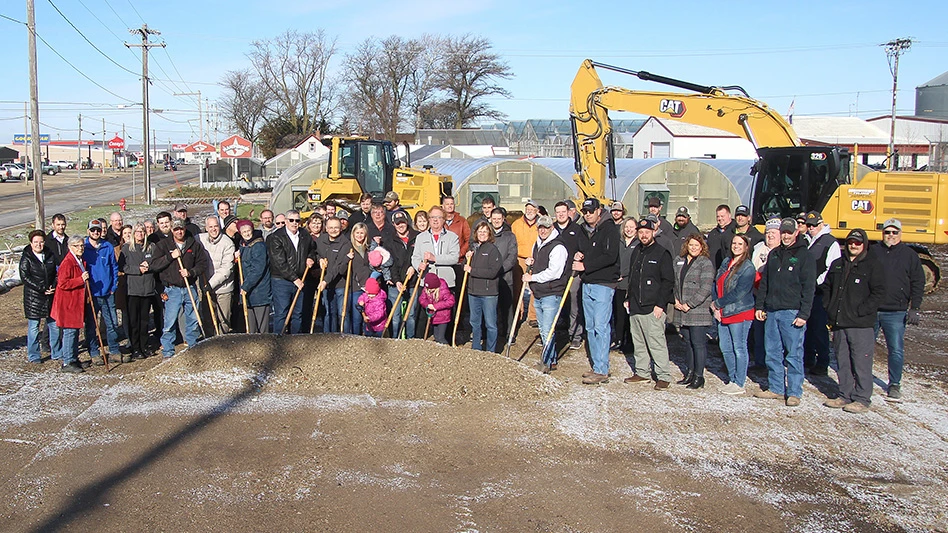
Shawn Cox, general manager of Arizona Wholesale Growers (AWG), has spent some time in the shoes of everyone in the company.
“My parents were very big on ‘you will never manage a nursery — at least not their nursery — unless you’ve done every job,’”he says.
Now when he meets with employees about what they’re doing, he has a deep appreciation for it. Because he’s been there.
“We’re constantly pushing for innovation here, and I can remember back in the day when we were on the canning pile and we did everything with shovels,” Shawn says. “We’ve had potting machines for at least 15 years, but I can remember what it was like to be a kid in the summer filling buckets with a shovel.”
AWG was founded by Shawn’s parents, Bill and Cindy Cox, in 1982. They started on 2.5 acres leased from their grandparents. It started as a bait and tackle business, a worm farm. One of their customers was a local nurseryman, and he suggested that they take some of the extra land they had and grow oleanders.
After a few years running the bait and tackle business and the nursery, Bill and Cindy decided they needed to pick one business and stick with it. Today, Arizona Wholesale Growers produces about 550 different species of plants. Early on it was mostly shrubs, then trees, then in the early ‘90s, the nursery began growing agaves, cactus and other drought-tolerant material. Over time, that has become a much larger portion of the business.
Now, 40 years after Shawn’s parents started the business, Arizona Wholesale Growers is growing on 160 acres. In 2022, the company purchased another 245 acres in the greater Phoenix area. They’re breaking ground this summer, putting in the well and the pond, and Shawn says within five years he hopes the nursery will have 400 acres in the valley.
In addition to the new acreage, under Shawn's leadership, AWG has doubled its sales every five years, developed and built a tissue culture lab and created an online retail division, Happy Valley Plants.
“Shawn Cox is not only a great leader, he is also a great innovator, mentor, motivator, teacher and friend to everyone he meets,” says John Kime, AWG’s sales manager.
Problems into opportunities
Being in the middle of the Southwest has its perks. AWG reaches the big markets of California and Texas. It aslo serves Nevada and New Mexico. And its plant material is well-acclimated to the sun and heat of those climates.
Before the wet winter of 2022, California was looking to reduce its water use, so the state was offering incentives for people to tear out their lawns and replace them with drought-tolerant material. These regulations helped AWG, which grows plenty of material adapted for the driest conditions.
“There’s a lot of people clamoring for this drought-tolerant material, and you know if it was grown in Phoenix that it’s going to be OK,” Shawn says.
In 1995, AWG expanded by purchasing land in Camp Verde, about 100 miles north of Phoenix. The Cox family added cooler-weather crops there, including stone fruit, cold-hardy cactus and agaves, as well as deciduous trees. At the end of the summer, when material in Phoenix starts to look stressed, they can bring material south from Camp Verde to the Phoenix market.
AWG’s customers are a fairly even split between landscape contractors, wholesale and retail garden centers. In-state, the nursery does a ton of business with local landscapers. Its biggest out-of-state customers are wholesale nurseries, rewholesale nurseries and retail garden centers.
During the early part of the COVID pandemic, supply chain issues increased business costs in areas like fertilizer and container prices, but especially for trucking.
“Leadership is problem solving and there is no problem that can't be solved,” John Kime says. “Problems are not problems for Shawn. Problems are opportunities to make work and lives better.”
The trucking problem turned into an opportunity to expand AWG’s reach.
“California historically has always been cheaper to buy plants out of than Arizona, and we got to this place during COVID where it started becoming as cheap or cheaper to pull material out of Arizona,” Shawn says.
This was the chance AWG needed to become priced competitively with California nurseries. AWG picked up a lot of business, especially from Texas.
“Honestly, what it allowed us to do was get a little bit of a foothold into other businesses to the east, allowed people to try our products and our customer service to see how they like us,” Shawn says. “We’ve maintained a lot of customers that we picked up a couple of years ago. It’s been a huge growth opportunity for us, and I find every year we’re shipping more and more east of Arizona, which is very exciting.”
Control your supply
One important lesson Bill and Cindy taught Shawn that they learned with the bait and tackle business was the importance of managing your supply.
“Back in the day it was worms and waterdogs,” Shawn says. “They went all the way up to Nebraska harvesting waterdogs. In the nursery, we’ve taken that lesson as well. If you want to maintain a large plant palette, you really have to do a lot of your own propagation and seed sourcing.”
During the COVID pandemic, when the supply chain issues began, Arizona Wholesale Growers was still impacted with items like stakes, pots and fertilizer. However, Shawn says the nursery dodged the worst of the crisis because his crew propagates so much of its material in-house.
“We started our cloning lab about three years ago, and we're finally at a point now where we have a little bit of extra availability,” Shawn says. "Bit by bit, we're getting to a point where we're able to offer some of those clone specialty agaves and aloes that people are looking for right now. We ship those not only around the country, but around the world.”
In 2018, Shawn and his wife Lauren, with the help of a friend, built the first cloning lab in their garage at home. It started as a fun side project, but it went well enough that Shawn decided to make it a legitimate part of the business.
“We had a couple of unique agaves we put up on Instagram and they really got traction,” he says. “We had a lot of people asking for them. I thought back to my folks and their way of building a culture of finding a way to take control of your supply to keep business steady. It got to a point where if we really wanted to make a go of this business, then we need these agaves. And the only way to get those agaves reliably is to make them ourselves.”
He came up with the brand Happy Valley Plants and built it into an online retailer, international wholesaler and plant liner company. Shawn took the lab out of his garage and built a full cloning lab with hospital-standard sterility and a team of six botanical experts, along with ongoing Arizona State University internships.
Soon after creating the brand, Shawn was contacted by customers in Europe and Asia. He’s found that European customers mainly want the well-known agaves and cactus. In Asia, customers are looking for collector’s items. After sending two shipping containers of drought-tolerant material to Japan, Shawn spent 10 days visiting existing customers and meeting some new ones. He even gave a talk to members of the Japanese Succulent Institute. After the talk, Shawn had a translator help him do a Q&A with attendees. Many of the participants brought their own agaves from home to show and tell him about how they were doing.
“It’s just so cool to talk with people who care so much about their hobby,” Shawn says. “You’d be blown away at how far they’ve taken it all. They’re showing me pictures of these incredible growing environments they’ve set up because it’s difficult to replicate the native environment in a place that can get so much rain and be so humid.”
The AWG lab produces more than 75,000 liners per year and has more than 25 different species currently in propagation. The work keeps ramping up, with a 200% increase in output every quarter.
Shawn graduated from Arizona State University with a degree in plant biochemistry and molecular biology. He did some cloning work in college. Since he worked with plants at a cellular level back then, he wasn’t worried that he wouldn’t be able to handle it.
“Luckily, I finally got the opportunity to specifically use my college degree in a bigger way than how I’d been using it before,” Shawn says.
He enjoys the challenge of working with plants at a genetic level. With the lab, he and his team have been creating new hybrids. He says he’s always looking for interesting cultivars that pop up in the nursery, but most of the effort has gone into cross-breeding agaves for specific characteristics. In the aftermath of the February 2021 Texas freeze, he noticed an increased demand for cold-tolerant agaves.
“They prefer big agaves, being from Texas,” Shawn says. “[Agave] ovatifolias, americanas, truncatas — but they also want cold-hardy.”
His group has been cross-breeding A. parryi truncata, A. utahensis and others with the goal of introducing a new look but keeping the cold tolerance.
Finding a dream team
One of the toughest parts of nursery production is determining what to grow. This is doubly true when it comes to new varieties. Nurseries have a limited amount of land to grow on and you need to decide what to grow in your space.
“It’s hard to pick a winner,” Shawn says. “The market decides what plant is going to trend, what plant is really going to catch fire and take hold in the industry. And it's difficult in our industry because wholesale nurseries are essentially manufacturers, putting these products together. But it’s a very long-term process. You've got these pillars in our industry: the landscape designers or the architects dreaming these projects up, the contractors or landscapers making it happen, doing the work on the ground. Then you’ve got the wholesale nurseries that are growing the plants for these jobs. There's a little bit of discord there, where we’re not all communicating on the same page.”
One of Shawn’s ideas to alleviate this problem was the creation of a horticulture design advisory board. He reached out to landscape architects from Arizona, California and Texas, a professor of environmental horticulture at ASU and landscapers who specifically work in procurement for large contractors in Arizona and California. He affectionately calls it the innovation “dream team.”
They get together twice a year and talk about plant breeding for challenging landscaping conditions, water conservation efforts and what can be done as an industry to try to steer people in a responsible direction. But the biggest advantage to meeting with this group is it allows the chance to potentially smooth out bumps in procurement.
AWG tries to draw attention to local native species and make the case as to where it fits inside the landscape industry. After making the pitch and asking for feedback, he’ll ask if the design board would want to give any of these plants a shot on one of their projects.
“Then, we’ll show them species that we're breeding together, and we'll explain our thought process on why we're breeding particular plants together,” Shawn says. “We’ll show those cultivars off to them and ask if they think we should go down this road.”
The first meeting was in 2022. AWG showed off some of its new agave hybrids, like a variegated A. parryi truncata, a variegated agave blue glow and a few others. The innovation team provided feedback and direction on what they liked, how they’d use it in jobs and how often they’d spec it. That feedback allows AWG to decide whether to ramp up production on those varieties in the lab, and in 2-3 years a decent quantity of 5-gallon containers will be available. Then the innovation team’s designers and architects start penciling them in for projects that will mature in 2-3 years.
“It’s allowed us to dovetail production from the lab with production and sales,” Shawn says. “I think that’s good for the industry to be able to see trends coming, at least fort the manufacturing side of it, and to support the architects and landscapers by having the things they’re looking for when they actually need them.”

Learning on the job
When Shawn was young, his parents pushed him to work in the restaurant industry.
“They were 100% on board with the idea that if you really want to learn how to work well with customers and how to provide good service, you should go wait tables,” Shawn says.
For five years from high school through college, that’s exactly what he did.
“My father has been my mentor, in regard to the work I do here with my hands,” Shawn says. “He’s the one who taught me how to glue pipe correctly. He’s the one who taught me how to diagnose water issues, how to check error codes on the VFDs and what to look for if there’s a problem with a plant.”
However, Shawn says his mother was his mentor for how to work with people in the company. She taught him how to communicate well with people and ask the right questions about what’s going on in their job, and what they’re dealing with in their day.

A third mentor came later. His name, ironically, was David Plant, an Australian who became well known in Arizona.
“He was constantly going around the valley and helping people with their fertigation systems and plant health diagnosis,” Shawn says. “He loved efficiency, so he was always trying to help people implement new technologies in the industry.”
For a brief time after college, Shawn spent a month touring Israel with David and a group of Arizona nurserymen. They toured a FIDO Tech facility and the company’s plant monitoring technology impressed AWG enough to buy it and implement it in Arizona. After adopting the system at AWG, Shawn would call Dave and ask him to help translate what the plant was telling them through the system. AWG made some huge changes to its irrigation system based on what they learned from that monitoring system, and it wouldn’t have happened without David’s mentorship and insistence on paying attention to the plant.
Though Shawn worked in the family business, he got the itch to do something new. For seven years, he worked as a math and science tutor. He especially enjoyed working with kids. However, after getting married, Shawn and his wife wanted to have kids of their own. The tutoring business is mostly evenings and weekends, and he wanted to be home with his family.
So he talked to his parents about returning to the family business. That was 12 years ago.
When he was in high school and college, he worked as a driver. He’d get up early, run a few plant deliveries and head to class. After college, his first job at AWG was gluing pipe for a building that was part of a new expansion. He joined the watering team after that, then moved into sales. He became the sales manager at one of AWG’s satellite locations and did that for three years. Then he spent two years as propagation manager, before pivoting back into sales and eventually general manager.
“I’ve had the good fortune to do pretty much all the roles in the business, and I think I've liked all of them except for accounting,” he laughs. “I did seven months in accounting, and I was very excited to get out — as much as I like numbers.”



Empowering employees
Like many in the industry, AWG has struggled to find new hires. To combat the difficulties of bringing new people in, Shawn focuses on promoting from within. He likes to sit down, face-to-face, with the people on his team and show them what they do and why they do it that way. He explains the reasoning behind it and adds context of how the company might have done it in the past. The goal is to give them a sense of ownership in what they’re doing on a day-to-day basis.
“I want to inspire the people on the team to know that they can come to work every day and make a difference,” he says. “I want someone who works with me to come in and evaluate why we’re doing what we’re doing and to think about the end user of our product. It’s mainly going to end up in someone’s home and it’s going to make a difference in their life every day. Or it’s going to end up at the park they take their kids to, or the commercial shopping center they go to. As managers, something we try to instill in people is if you can see down the road and envision the steps it takes to get there, you are invested in each of the steps to get that plant to its mature possibility.”
Shawn believes in giving people the ability to make choices on their own and then talking to them about the results of their choices. This is his way of empowering his staff to love their work.
Back to nature
When Shawn started organizing donations for the Arizona Nursery Association, he started convincing the association members that donations should be more plant-related. He got involved with the U.S. Forest Service, and specifically a local charity called Natural Restorations. He started by providing native plant material that didn’t meet quality standards for a residential installation to help reforest burn areas affected by wildfires. Then he started convincing other wholesale nurseries to get involved, too.
Well before working at the nursery, the outdoors was an important part of Shawn’s life. As a kid, he went camping a lot. It was a cheap vacation, he says, and with his parents running a bait and tackle shop, you can bet there was fishing involved. Whether hunting mule deer in the desert or elk in the woods, or fishing in small lakes in the mountains, he enjoyed the outdoors.
Shawn and Lauren have three sons, and he can’t wait to go hiking and backpacking with them when they’ve grown a bit (they’re currently 9, 6 and 2 years old).
Probably his favorite place to hike is Olympia National Park in Washington, where the domestic rainforest awes him every time he visits.
“The desert is beautiful, especially after a rain,” he says. “But I’m a third-generation Arizona native. Sometimes going up to just about the wettest place in the country is a fun change.”
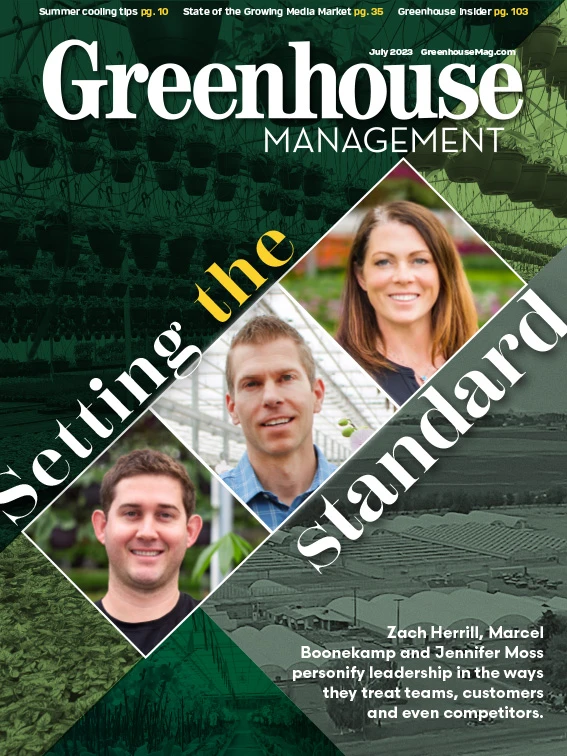
Explore the July 2023 Issue
Check out more from this issue and find your next story to read.
Latest from Greenhouse Management
- This month's Greenhouse Management magazine is about native plants and sustainability
- The HC Companies, Classic Home & Garden merge as Growscape
- Terra Nova releases new echinacea variety, 'Fringe Festival'
- Eason Horticultural Resources will now officially be known as EHR
- BioWorks receives EPA approval for new biological insecticide for thrips, aphids, whiteflies
- ScottsMiracle-Gro transfers cannabis subsidiary to focus on core lawn and garden business
- Should we start calling natives 'eco-beneficial plants'?
- Ellen Mackenbach-Lakeman appointed new CEO of Dümmen Orange

